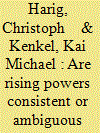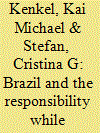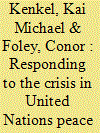| Srl | Item |
| 1 |
ID:
153860


|
|
|
|
|
| Summary/Abstract |
This article illustrates how Brazil responded to the policy challenges its foreign policy activism posed for its engagement with a fundamental question of the international order: the tension between the protection of human rights and the prohibitions on intervention and the use of force. Leading the military component of the UN Stabilization Mission in Haiti (MINUSTAH) implicated accepting the mission's robust mandate that contradicted Brazil's traditional foreign policy positions. Notwithstanding this apparent contradiction, the country's diplomats also tried to shape UN debates on intervention norms, resulting inter alia in the ‘responsibility while protecting’ initiative. By analysing diplomatic efforts and military actions on the ground, we argue that since the watershed moment of becoming the most influential troop contributor to MINUSTAH, interests and actions of the armed forces increasingly contradict the efforts of Brazil's diplomatic establishment. The influence of Brazil's diplomacy in shaping intervention norms has proved to be rather elusive, compared with its military's palpable role in developing robust approaches for peacekeeping mandates revolving around the protection of civilians. Yet we argue that this apparent contradiction should not be seen as inconsistency. Instead, the case of Brazil shows typical signs of the ‘graduation dilemma’, in which both diplomats and military behaved in an eminently rational fashion.
|
|
|
|
|
|
|
|
|
|
|
|
|
|
|
|
| 2 |
ID:
144465


|
|
|
|
|
| Summary/Abstract |
This article examines Brazil's responsibility while protecting (RwP) initiative as an example of norm sponsorship available to nonpermanent members of the Security Council. After setting the stage with Brazil's historical engagement with intervention issues, it discusses the reasons behind the Brazilian initiative. It examines RwP's key proposals and the reactions they generated. RwP's normative implications are discussed, together with an examination of the main reasons why Brazil's sponsorship of the initiative waned following its exit from the Council. Brazil's withdrawal from sponsoring RwP highlights the need for ongoing support for initiatives that seek to revive the international community's intervention practices by tackling the basic tenets of discord over R2P's implementation.
|
|
|
|
|
|
|
|
|
|
|
|
|
|
|
|
| 3 |
ID:
177757


|
|
|
|
|
| Summary/Abstract |
This special forum discusses the future trajectory of UN peace operations at a time many stakeholders and analysts consider to be one of crisis, contestation, or at the very least transition. The UN is facing difficulties in responding effectively to many of the world’s worst recent conflicts, even where it has (or until recently had) operations. Even before COVID-19, the blue helmets were facing a period of serious retrenchment and budgetary constraints. Mission mandates have experienced a transformation, from the recent “robust turn” to the incorporation of stabilization mandates grounded in counterinsurgency/counterterrorism doctrine. The crossroads of economic downturn, geopolitical realignment and continuous adaptation of peacekeeping practice provides the backdrop of the contributions to the special forum that follows. The analyses presented here not only accompany the ongoing evolution of the nexus of issues that constitute peacekeeping studies but also reflect the breadth and depth of the extensive attendant academic literature.
|
|
|
|
|
|
|
|
|
|
|
|
|
|
|
|
| 4 |
ID:
151293


|
|
|
|
|
| Summary/Abstract |
The papers in this special section are the results of two workshops that were held in 2014, both organized by the editors of this special section. The first workshop was financed by a Venture Research Grant from the International Studies Association and held at that organization’s Annual Convention in Toronto in March 2014. The second was held in Rio de Janeiro in September of that year, under the auspices of the Institute of International Relations of the Pontifical Catholic University of Rio de Janeiro (IRI/PUC-Rio). Both workshops were concerned with mapping out in both conceptual and empirical terms how a new generation of emerging powers were attempting to reshape the international order. Much has changed over the last two years since those workshops took place. While there were storm clouds on the horizon even back then, at the time of writing virtually all the emerging powers find themselves mired in significant difficulties that will weigh down and perhaps in some cases even snap their upwards ascent.
|
|
|
|
|
|
|
|
|
|
|
|
|
|
|
|
| 5 |
ID:
099917


|
|
|
|
|
| Publication |
2010.
|
| Summary/Abstract |
This article assesses the utility of the notion of emerging powers in analysing key characteristics of Brazil's past and present policy towards peace operations. After decoupling emerging powers analytically from traditional middle powers, it addresses a series of political and behavioural factors specific to South America. Finally, the analysis identifies those elements derived from Brazil's emerging power status and South American identity that are of relevance in shaping the country's attitudes towards peace operations generally, and more specifically its participation in the United Nations Stabilization Mission in Haiti (MINUSTAH). It reaches the conclusion that Brazil has acted as a model emerging power - in typically South American Fashion.
|
|
|
|
|
|
|
|
|
|
|
|
|
|
|
|
| 6 |
ID:
177760


|
|
|
|
|
| Summary/Abstract |
This article highlights the domestic effects of the ongoing changes in United Nations peacekeeping practice on troop contributing states from the Global South. It juxtaposes scholarship on stabilization, the specific motivations of Global South troop contributing countries, and in particular the effects on civilian control of armed forces of peacekeeping participation. It argues that the “diversionary peace” hypothesis—which posits beneficial effects on civilian control for peacekeeping—has not obtained, and that current developments in United Nations peace operations will negatively affect civil–military relations in postcolonial sending countries. The text suggests avenues for future inquiry. One is the notion that stabilization may lead to a net negative effect on civilian control in unconsolidated democracies. This is due to stabilization's increased militarization, and its turn towards objectives that mimic the counterinsurgency mandates associated with military rule in the Global South, rather than a focus on the socioeconomic well-being of local populations.
|
|
|
|
|
|
|
|
|
|
|
|
|
|
|
|